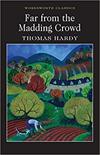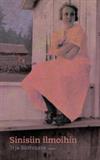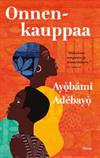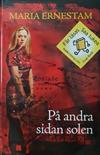
Far from the Madding Crowd
1 journaler for this copy...
Bought as a treat last week.
This is the first time I have dabbled my toes in the pool of Thomas Hardy. I was familiar with this story as with a few others, via films and tv series (yes, the sin of seeing the film before reading the book) and had enjoyed them but found some intensely depressing, which has put me off going anywhere near Hardy. Far From the Madding Crowd does at least end on a happy note, but there are some side plots of very, very sad lives in this book. As it with life. But in some cases it’s even sadder as it all seems to be unintentionally self-inflicted.
I don’t even know if the plot needs summarising as everyone knows it. So many people who saw me reading the book said, ‘oh, I did that one at school’. It’s about marriage, money – gaining and losing it, social hierarchy, and I suppose the coming of age and growing up of a young woman in her twenties. Bathsheda Everdeane is the main character, a spirited young woman, who is often described as vain with old man shaking their heads in a disapproving way as if to say such women will come to a bad end. Vain… well, she’s young, but she’s also got a bit of personality and ompf about her, so I liked her. None of us were born perfect and are all in development so you’ve got to forgive her the thoughtless moments. I don’t know whether Hardy’s trying to show us that strong women are good (consider Fanny Robbins, fading out to a tragic end) or that vain and bold women need to calm down and learn their place if they’re to have good lives. But then I think it also shows that you shouldn’t just marry because you’re asked and it’s the done thing, or because you’re consumed with lust, but because you love that person. That’s the only type of marriage that will last. She turns down her first two proposals on the very good grounds that she doesn’t love the men, in both cases hardly knows them. Both Gabriel Oak and Boldwood have been watching her (bit stalkerish), think she’s really attractive and bold, fill in the rest of her personality through their imagination and fall in love with that mental version of her. She turns them down. Neither seem to get that it should be a two way thing, and don’t really understand at the time why she’s saying no. Then in comes Sergeant Troy, whose true love is Fanny Robbin, but they don’t get married due to a mix up over churches and his impulsive, arrogant streak. He then bumps into Bathsheba and is consumed by her beauty – again, it’s all just lust. But in this case, Bathsheba is caught under that same breathless obsession herself. Neither are willing to acknowledge all the traits of the other, warts and all, and get married. In this case they get to work through the obsessed lust, calm down and sadly grow to hate each other. I’m sure the fact they both realise that Troy actually loves Fanny Robbins doesn’t help matters. In the case of Boldwood, he doesn’t find a way through the lust and it literally drives him mad. He is obsessed with marrying Bathsheba, after Troy vanishes and is presumed dead, he is constantly pestering for a promise of marriage. And when Troy turns up alive, he shoots him dead. It turns out he’d been buying luxury goods for Bathsheba’s new life. The man was obsessed. And he ends up in prison. Not a happy end for a previously stable and successful farmer.
I’ve not read the bible and I’m not religious so I’m not familiar with religious references. I thought Bathsheba was a biblical name, so I looked it up on Wikepedia. And it seems that Bathsheba was married to a military man, Uriah. King David saw her bathing, liked what he saw, got a bit obsessed and slept with her, getting her pregnant. He then tried to pay off Uriah to take her back and the child as his. So, I’m guessing this has been some inspiration in the story? Considering part way through, Boldwood actually gives Troy a bag of money if he'll marry Bathsheba (Boldwood believing they’re sleeping together before marriage, when actually they are already secretly married). But I wouldn’t say Troy is the original hard-done-by husband and Bathsheba isn’t the passive wife who is used and abused. Although being married to Troy gives her a very low opinion of marriage, which she can’t be blamed for given that he gambles away her money, is in love with another women, and even when said woman is dead, he tells Bathsheba the corpse means more to him than she ever will. He’s quite happy to sod off for a year, letting everyone assume he is dead, having spent the last of the money on a grand gravestone for his true love. Interestingly, Bathsheba tells her companion Liddy that marriage is to be endured, you’ve got to stand fast and take the slashes – “Stand your ground and be cut to pieces” (p. 242) Which is essentially how their courtship started out, when she and Troy met in a little dell and she trusted him enough to stand still, whilst he was showing off his fencing exercises and general swordmanship by swiping the sword ever so close to her but never cutting her. The marriage that looks as though it has the best chance of working (we don’t find out as the story ends there) is between Bathsheba and Oak, when they’ve actually had time to get to know one another, work together and become friends. They rescue one another, she saves him from suffocation in an unventilated shepherd’s hut and he rescues her crops and sheep on various occasions from fire, rain and far too much clover.
It is a romance with a lot of real-life-is-grim side plots and a lot of rose-tinted sighing over the landscape, farming practices and the good old honest country folk (except when they’ve had cider to drink. It seems alcohol is the devil’s work!).
I don’t even know if the plot needs summarising as everyone knows it. So many people who saw me reading the book said, ‘oh, I did that one at school’. It’s about marriage, money – gaining and losing it, social hierarchy, and I suppose the coming of age and growing up of a young woman in her twenties. Bathsheda Everdeane is the main character, a spirited young woman, who is often described as vain with old man shaking their heads in a disapproving way as if to say such women will come to a bad end. Vain… well, she’s young, but she’s also got a bit of personality and ompf about her, so I liked her. None of us were born perfect and are all in development so you’ve got to forgive her the thoughtless moments. I don’t know whether Hardy’s trying to show us that strong women are good (consider Fanny Robbins, fading out to a tragic end) or that vain and bold women need to calm down and learn their place if they’re to have good lives. But then I think it also shows that you shouldn’t just marry because you’re asked and it’s the done thing, or because you’re consumed with lust, but because you love that person. That’s the only type of marriage that will last. She turns down her first two proposals on the very good grounds that she doesn’t love the men, in both cases hardly knows them. Both Gabriel Oak and Boldwood have been watching her (bit stalkerish), think she’s really attractive and bold, fill in the rest of her personality through their imagination and fall in love with that mental version of her. She turns them down. Neither seem to get that it should be a two way thing, and don’t really understand at the time why she’s saying no. Then in comes Sergeant Troy, whose true love is Fanny Robbin, but they don’t get married due to a mix up over churches and his impulsive, arrogant streak. He then bumps into Bathsheba and is consumed by her beauty – again, it’s all just lust. But in this case, Bathsheba is caught under that same breathless obsession herself. Neither are willing to acknowledge all the traits of the other, warts and all, and get married. In this case they get to work through the obsessed lust, calm down and sadly grow to hate each other. I’m sure the fact they both realise that Troy actually loves Fanny Robbins doesn’t help matters. In the case of Boldwood, he doesn’t find a way through the lust and it literally drives him mad. He is obsessed with marrying Bathsheba, after Troy vanishes and is presumed dead, he is constantly pestering for a promise of marriage. And when Troy turns up alive, he shoots him dead. It turns out he’d been buying luxury goods for Bathsheba’s new life. The man was obsessed. And he ends up in prison. Not a happy end for a previously stable and successful farmer.
I’ve not read the bible and I’m not religious so I’m not familiar with religious references. I thought Bathsheba was a biblical name, so I looked it up on Wikepedia. And it seems that Bathsheba was married to a military man, Uriah. King David saw her bathing, liked what he saw, got a bit obsessed and slept with her, getting her pregnant. He then tried to pay off Uriah to take her back and the child as his. So, I’m guessing this has been some inspiration in the story? Considering part way through, Boldwood actually gives Troy a bag of money if he'll marry Bathsheba (Boldwood believing they’re sleeping together before marriage, when actually they are already secretly married). But I wouldn’t say Troy is the original hard-done-by husband and Bathsheba isn’t the passive wife who is used and abused. Although being married to Troy gives her a very low opinion of marriage, which she can’t be blamed for given that he gambles away her money, is in love with another women, and even when said woman is dead, he tells Bathsheba the corpse means more to him than she ever will. He’s quite happy to sod off for a year, letting everyone assume he is dead, having spent the last of the money on a grand gravestone for his true love. Interestingly, Bathsheba tells her companion Liddy that marriage is to be endured, you’ve got to stand fast and take the slashes – “Stand your ground and be cut to pieces” (p. 242) Which is essentially how their courtship started out, when she and Troy met in a little dell and she trusted him enough to stand still, whilst he was showing off his fencing exercises and general swordmanship by swiping the sword ever so close to her but never cutting her. The marriage that looks as though it has the best chance of working (we don’t find out as the story ends there) is between Bathsheba and Oak, when they’ve actually had time to get to know one another, work together and become friends. They rescue one another, she saves him from suffocation in an unventilated shepherd’s hut and he rescues her crops and sheep on various occasions from fire, rain and far too much clover.
It is a romance with a lot of real-life-is-grim side plots and a lot of rose-tinted sighing over the landscape, farming practices and the good old honest country folk (except when they’ve had cider to drink. It seems alcohol is the devil’s work!).







